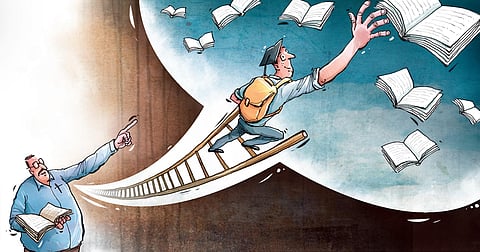

If some recent developments are any indication, Kerala's higher education is lurching towards an impasse. The unilateral actions of the Governor as Chancellor, the aggressive reactions of the Left Front government, and the universities openly challenging the Chancellor's authority all warrant such a conclusion. One is forced to ask, seeing all this: As the crucifixion of Jesus Christ had divided history into two (BC & AC), will this confrontation between the stakeholders result in a similar division of the history of Kerala's higher education into Before Confrontation (BC) and After Confrontation (AC)?
It's true that some of the issues about which the Chancellor expresses his concern need to be taken seriously – instances of maladministration reported from some of the Universities being just one example. That said, how he seeks to address these problems leaves much to be desired. It often gives the impression that he places too much faith in his democratic correctness while discounting the same in others. Also, of late, he is constantly keeping the government on tenterhooks on many issues. This is why some people attribute political motives to his actions and utterances.
The government, on its part, shows a deep faith in its political correctness and seeks to justify its actions based on its electoral mandate. Furthermore, as elsewhere in India, the Universities in the state also remain politicised, reducing most of the Vice-Chancellors to mere profiles, pawns in the hands of the ruling establishment, irrespective of which party calls the shots. As a result, many of them could hardly handle a crisis sagaciously or speak truth to power.
The current developments in Kerala's higher education sector must be viewed against this background. Among these, the move of the Chancellor seeking the resignation of nine Vice-Chancellors based on the Supreme Court Judgement in the APJ Abdul Kalam Technological University case is the latest and by far the most aggressive one. Notices were also served on the ViceChancellors of SNG Open University and Digital University. This means that 69 per cent of the State Universities will soon be without a regular Vice-Chancellor. If Kalamandalam and Agricultural Universities, which already function without a regular executive head, are added, the percentage makes a quantum jump to eighty-one! Considering the probability of litigations, these institutions will have to remain headless (without a regular VC) for at least the coming year.
It goes without saying that this would be calamitous for higher education in Kerala, which is already beset with many a problem. This would be more so as the government is planning to bring about a thorough restructuring of the system. All three commissions appointed for the purpose have already submitted their reports, and the higher education department is going full steam in organising discussions on these reports and reaching an informed consensus on the issue.
Interestingly, what worries the government is not merely the eventuality of the Universities remaining rudderless at a time when it is contemplating deep reforms. While that remains a serious issue, it is more worrisome for it is the possibility of a new set of Vice-Chancellors, toeing a different political line, assuming office once the Chancellor sets the appointment process in motion. This will, no doubt, open up a new channel for the BJP to penetrate the higher education sector of the state, making inroads into its cultural arena as well. This is a cause for concern. Confrontation or Reconciliation?
Looking at the unfolding political developments, it is clear that the LDF is taking it as a political issue. The front is going ahead with its plan to organise state-wide protests, the culmination of which is the convergence of about one lakh people before the Raj Bhavan on November 15. While it has every right to do so, it would be in its interest if its leadership applied its mind on two issues: the consequence of such a large-scale mobilisation turning violent, more so as BJP is contemplating a counter-mobilisation strategy. Remember, storms always work with sound effects. The second is about the fallout of the conflict with the Governor on governance. For every pitfall, it is not the Governor but the government which is answerable to the people. Gone are the days when a party or front could also hold power and organise agitations.
This also gives one the impression that it is all about fixing and shifting the responsibility for the crisis a la Pontius Pilate washing his hands and shirking the accountability for his deeds. But everybody involved in this game is forgetting that the real issue before the people of Kerala is not about locating responsibility but its consequences for their children's educational future.
One is reminded of the question Napoleon's mother asked him whenever he boasted about his exploits: "How long, my son?" The question before us is also the same. How long could the state endure all this - the Chancellor and the government going their separate ways --and the resultant troubles? Won't they realise this is like the sea arguing with the rock? It's nice if they understand that, as in Mahabharata, democracy has many heroes, and governance consists of mutual respect and sticking to one's turf. Otherwise, the result would be the proverbial epic battle. Democracy cannot withstand such a denouement as it can hardly take too high a political voltage without damaging the balance of power and mutual respect that hold institutions accountable and functional.
Dr. J. Prabhash
Formerly, Professor of Political Science at the University of Kerala